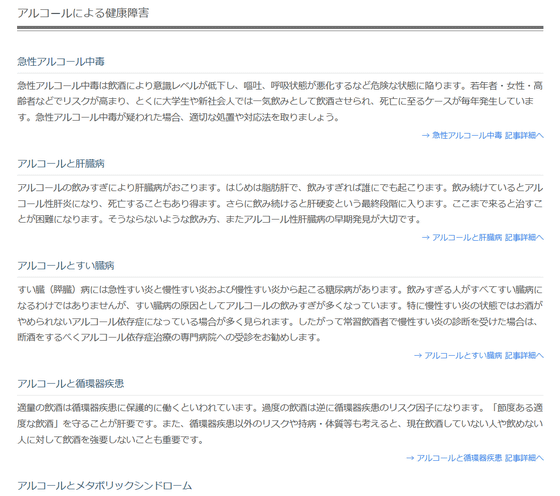What was the problem with the 'large-scale research on alcohol drinking' that failed even though more than 10 billion yen was invested?

It's no longer common sense that alcohol is harmful to your health, but there are studies that show that the right amount of alcohol has a positive effect on your health, as the saying goes, 'alcohol is the chief of medicine.' Blogger dynomight broke down a large clinical trial of four years and $ 100 million in funding, 'What if I keep drinking alcohol every day?' Explains 'what is the real problem'.
The big alcohol study that didn't happen: My primal scream of rage
https://dynomight.net/alcohol-trial/
Alcohol is a drink that is loved all over the world, but liver disease, pancreatic disease, cardiovascular disease, oral cancer, pharyngeal cancer, laryngeal cancer, esophageal cancer, liver cancer, colon cancer, It is known to be associated with depression and suicide in addition to various illnesses such as various gastrointestinal diseases, hepatitis, gout, diabetes and hyperlipidemia.
Alcohol Health Disorders | Alcohols | e-Health Net (Ministry of Health, Labor and Welfare)
https://www.e-healthnet.mhlw.go.jp/information/alcohol-summaries/a-01

So, isn't alcohol 100% bad for your health? 'Two glasses for men and one for women reduces the risk of heart-related death by 20%.' 'A small amount of alcohol temporarily lowers blood pressure. There is a research result that 'it has the effect of making it', and there is also a view that a small amount has a positive effect on a specific health aspect.
In the midst of this scientific debate over alcohol, the National Institute of Alcohol Abuse and Addiction (NIAAA), a research institute specializing in alcohol under the National Institutes of Health (NIH), which oversees public medical research in the United States. ) Started a large-scale study in 2014 with a budget of $ 100 million and 10 years to investigate 'what happens if you continue to drink alcohol every day'.
The experiment lasted for about four years, but a report from The New York Times in the American letter caused 'suspicions of benefiting the alcohol industry.' As mentioned above, this research required a huge budget, but more than half of it, or $ 6.77 million (about 7 billion yen), is a liquor company called Anheiser Bush InBev, Heineken, Diageo, Pernod Ricard, Carlsberg 5 It turns out that it was contributed by the company. It became a big problem because it violated the NIH rule 'Prohibit solicitation and proposal of donations and support funds'.
Suspicion that the alcoholic beverage industry has provided funding for scientists studying alcohol-GIGAZINE

Investigations conducted after the incident were discovered confirmed that the people involved in the research frequently emailed employees of the alcohol industry, outside scientists, and people from research institutes on alcohol. The large-scale research was discontinued, and the project, which was supposed to be carried out with a total budget of 100 million dollars, was abandoned.
This time, blogger dynomight explains a number of problems that existed from the start to the end of this large-scale research. According to an email sent to the alcohol industry by NIAAA officials before the start of the study, the large study 'has important findings showing that moderate drinking is safe.' 'Although it receives funding from the alcohol industry, There is no interaction between the alcohol industry and the research team, so there is no need to worry about collusion with the industry. '
This is what dynomight argues, which dynomight argues that 'if it's funded, it can't be unaffected' and 'if it's funded, it should be stated.' .. dynomight argues that the impact is unavoidable without direct interaction with the research team, as it can put pressure on the industry to withdraw funds. 'Personally, research conducted with funding from interested parties is also accepted,' but in order to examine the research results based on the funding, it is clearly stated whether or not funding is provided. Pointed out that it needs to be.
In addition, dynomight says that there is a problem with the way the media is reported. For example, in the supplement industry, which is said to be particularly contaminated with counterfeit products and harmful substances, consumers are demanding high-quality supplements, so supplement sales companies are seeking to fund independent organizations to check their safety. It is beneficial for both the sales company and the consumer.

On the other hand, the New York Times report, which started the series of problems, is funded by the fact that the research is funded by the alcohol industry and the views of those who are involved in the research of the problem. It was an 'editorial disguised as journalism' with the conclusion that the offer was absolutely evil. For this reason, dynomight said, 'I'm glad that The New York Times took up this case and clarified the problems of the research, but the problem of funding from the industry funded by the industry. Should have been based on the premise that it could be overcome, at least in principle. '
In addition, dynomight claims that the response of the alcohol industry and NIH after the incident was unsuccessful. According to dynomight, the alcohol industry should have recognized the problem when the New York Times was reported, but did nothing. NIH also said that it had 'dismissed three people related to the problem,' despite the fact that it had been taxed at least $ 4 million, and took any measures to prevent recurrence. There seems to be no sign of taking it.
From this point, dynomight said, 'I'm angry at every point.'
Related Posts:
in Note, Posted by darkhorse_log






